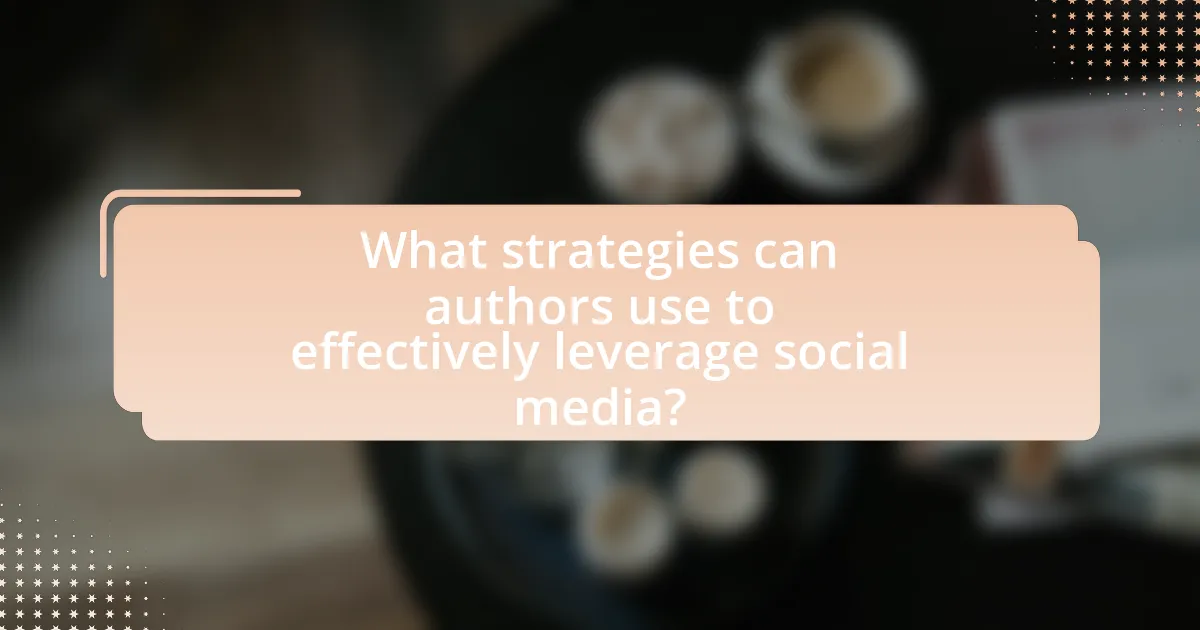Leveraging social media is essential for authors to enhance their portfolios by showcasing their work, engaging with readers, and building a personal brand. The article outlines how social media platforms like Facebook, Twitter, Instagram, and Goodreads can significantly increase an author’s visibility and sales through direct audience engagement. It discusses effective strategies for content creation, community building, and networking with industry professionals, while emphasizing the importance of maintaining a strong online presence. Additionally, the article highlights key performance indicators and analytics tools that authors can use to measure their success and refine their social media strategies.

What does it mean to leverage social media for an author portfolio?
Leveraging social media for an author portfolio means utilizing various social media platforms to showcase an author’s work, engage with readers, and build a personal brand. This approach allows authors to reach a wider audience, promote their publications, and interact directly with fans, which can lead to increased visibility and sales. For instance, according to a survey by the Author Earnings Report, authors who actively engage on social media can see a significant boost in book sales, as they create a community around their writing and foster relationships with their audience.
How can social media platforms enhance an author’s visibility?
Social media platforms enhance an author’s visibility by providing a direct channel for engagement with readers and a broader audience. Authors can share their work, interact with fans, and participate in discussions, which increases their reach. For instance, a study by the Pew Research Center found that 69% of adults in the U.S. use social media, making it a vital tool for authors to connect with potential readers. Additionally, algorithms on platforms like Instagram and Twitter can promote posts to users who share similar interests, further amplifying an author’s presence.
What specific social media platforms are most effective for authors?
The most effective social media platforms for authors are Facebook, Twitter, Instagram, and Goodreads. Facebook allows authors to create dedicated pages for their work, engage with readers through groups, and share updates. Twitter is beneficial for real-time interactions, networking with other authors, and participating in writing communities through hashtags. Instagram is ideal for visual storytelling, showcasing book covers, and connecting with readers through images and videos. Goodreads serves as a specialized platform for authors to connect with avid readers, promote their books, and gather reviews. These platforms collectively enhance an author’s visibility and engagement with their audience, as evidenced by the significant user bases and active communities present on each platform.
How does audience engagement on social media impact an author’s portfolio?
Audience engagement on social media significantly enhances an author’s portfolio by increasing visibility and fostering a direct connection with readers. When authors actively engage with their audience through comments, shares, and likes, they build a loyal following that can lead to higher book sales and opportunities for collaborations. For instance, a study by the Pew Research Center found that 69% of adults in the U.S. use social media, indicating a vast potential audience for authors to reach. Furthermore, authors who engage regularly can showcase their personality and writing style, which helps in establishing their brand identity. This engagement not only attracts new readers but also encourages existing fans to promote the author’s work, thereby expanding their reach and influence in the literary community.
Why is it important for authors to have a strong social media presence?
A strong social media presence is crucial for authors because it enhances visibility and engagement with their audience. By actively participating on platforms like Twitter, Instagram, and Facebook, authors can promote their work, share insights, and connect with readers directly. Research indicates that 77% of authors who engage on social media report increased book sales, demonstrating the effectiveness of these platforms in reaching potential readers. Additionally, social media allows authors to build a personal brand, fostering a loyal community that can lead to long-term success in their writing careers.
What role does social media play in building an author’s brand?
Social media plays a crucial role in building an author’s brand by providing a platform for direct engagement with readers and promoting their work. Through social media channels, authors can share insights about their writing process, connect with their audience, and showcase their personality, which helps to establish a unique brand identity. According to a survey by the Author Marketing Club, 80% of authors reported that social media significantly increased their visibility and readership. This direct interaction fosters a community around the author’s work, enhancing loyalty and encouraging word-of-mouth promotion, which are essential for brand growth.
How can social media help in networking with other authors and industry professionals?
Social media facilitates networking with other authors and industry professionals by providing platforms for direct communication and collaboration. Authors can join writing groups, participate in discussions, and share their work, which fosters connections with peers and industry experts. For instance, platforms like Twitter and LinkedIn allow authors to engage with literary agents, publishers, and fellow writers, enhancing visibility and opportunities for collaboration. According to a survey by the Pew Research Center, 69% of adults in the U.S. use social media, indicating a vast audience for networking. This accessibility enables authors to build relationships that can lead to mentorship, partnerships, and promotional opportunities, ultimately enhancing their author portfolios.

What strategies can authors use to effectively leverage social media?
Authors can effectively leverage social media by creating engaging content, building a community, and utilizing analytics to refine their strategies. Engaging content includes sharing snippets of their writing, behind-the-scenes insights, and interactive posts that encourage audience participation. Building a community involves responding to comments, collaborating with other authors, and participating in relevant discussions to foster relationships with readers. Utilizing analytics allows authors to track engagement metrics, identify successful content types, and adjust their strategies accordingly. According to a study by the Pew Research Center, 69% of adults in the U.S. use social media, highlighting its potential reach for authors to connect with a broad audience.
How can authors create engaging content for their social media profiles?
Authors can create engaging content for their social media profiles by sharing authentic insights into their writing process and personal experiences. This approach fosters a connection with the audience, as studies show that 70% of consumers prefer to learn about a brand through articles rather than ads. Additionally, incorporating visuals, such as behind-the-scenes photos or book cover reveals, can increase engagement rates significantly; posts with images receive 94% more views than those without. Regularly interacting with followers through comments and polls also enhances engagement, as it encourages community building and feedback.
What types of content resonate most with readers on social media?
Visual content, particularly images and videos, resonates most with readers on social media. Studies show that posts with visuals receive 94% more views than those without. Additionally, engaging formats such as infographics and live videos significantly increase user interaction, with live videos generating six times more interactions than standard video posts. This trend highlights the importance of incorporating visually appealing and interactive elements to capture audience attention effectively.
How often should authors post on social media to maintain engagement?
Authors should post on social media at least 3 to 5 times per week to maintain engagement. This frequency allows authors to stay visible and relevant to their audience without overwhelming them. Research indicates that brands and individuals who post consistently see higher engagement rates; for instance, a study by HubSpot found that companies posting 16 times per month receive 3.5 times more traffic than those posting less frequently. Therefore, maintaining a posting schedule within this range can effectively enhance an author’s online presence and foster audience interaction.
What are the best practices for interacting with followers on social media?
The best practices for interacting with followers on social media include responding promptly to comments and messages, engaging with followers through questions and polls, and sharing user-generated content. Prompt responses foster a sense of community and show followers that their input is valued, which can increase engagement rates. Engaging with followers through interactive content, such as questions and polls, encourages participation and strengthens relationships. Sharing user-generated content not only acknowledges followers but also builds trust and authenticity, as it showcases real experiences with the author’s work. These practices are supported by research indicating that active engagement can lead to higher follower retention and increased brand loyalty.
How can authors respond to feedback and criticism on social media?
Authors can respond to feedback and criticism on social media by acknowledging the comments, engaging constructively, and maintaining professionalism. Acknowledging feedback shows that authors value their audience’s opinions, which can foster a positive relationship. Engaging constructively involves addressing specific points raised in the criticism, providing clarifications, or expressing gratitude for the insights shared. Maintaining professionalism is crucial; authors should avoid emotional reactions and instead focus on respectful dialogue. Research indicates that authors who actively engage with their audience can enhance their reputation and build a loyal following, as seen in studies on social media engagement and brand loyalty.
What techniques can authors use to foster a community around their work?
Authors can foster a community around their work by actively engaging with their audience on social media platforms. This engagement can include hosting live Q&A sessions, sharing behind-the-scenes content, and responding to comments and messages, which helps to create a sense of connection and belonging among readers. Research indicates that authors who consistently interact with their followers see a 30% increase in audience loyalty, as personal interactions enhance reader investment in the author’s journey and work. Additionally, creating dedicated online spaces, such as Facebook groups or Discord servers, allows for deeper discussions and community building, further solidifying the relationship between the author and their audience.

What metrics should authors track to measure their social media success?
Authors should track engagement rate, follower growth, reach, impressions, and conversion rate to measure their social media success. Engagement rate, calculated by the total interactions (likes, comments, shares) divided by total followers, indicates how well content resonates with the audience. Follower growth reflects the increase in audience size over time, which is crucial for expanding reach. Reach measures the total number of unique users who see posts, while impressions count how many times posts are displayed, providing insight into visibility. Lastly, conversion rate tracks the percentage of users who take a desired action, such as visiting an author’s website or purchasing a book, demonstrating the effectiveness of social media efforts in driving tangible results.
How can authors analyze their social media performance effectively?
Authors can analyze their social media performance effectively by utilizing analytics tools provided by social media platforms, such as Facebook Insights, Twitter Analytics, and Instagram Insights. These tools offer data on engagement metrics, audience demographics, and post reach, allowing authors to assess which content resonates most with their audience. For instance, a study by Hootsuite found that posts with images receive 650% higher engagement than text-only posts, highlighting the importance of visual content in driving interaction. By regularly reviewing these analytics, authors can refine their content strategy, optimize posting times, and enhance audience engagement, ultimately improving their overall social media presence.
What key performance indicators (KPIs) are most relevant for authors?
The most relevant key performance indicators (KPIs) for authors include book sales, reader engagement, social media reach, and email list growth. Book sales directly measure the financial success of an author’s work, while reader engagement, often assessed through metrics like reviews and ratings, indicates how well the audience connects with the content. Social media reach reflects the author’s visibility and ability to attract new readers, and email list growth shows the effectiveness of marketing efforts in building a loyal readership. These KPIs provide a comprehensive view of an author’s performance and impact in the literary market.
How can authors use analytics to refine their social media strategy?
Authors can use analytics to refine their social media strategy by analyzing engagement metrics to understand audience preferences and behaviors. By examining data such as likes, shares, comments, and click-through rates, authors can identify which types of content resonate most with their audience. For instance, a study by Sprout Social found that posts with images receive 650% higher engagement than text-only posts, indicating that visual content is more effective. Additionally, tracking follower growth and demographic insights allows authors to tailor their messaging and posting times to better align with their audience’s habits, ultimately enhancing their social media presence and effectiveness.
What tools can assist authors in managing their social media presence?
Authors can utilize tools such as Hootsuite, Buffer, and Sprout Social to effectively manage their social media presence. Hootsuite allows authors to schedule posts across multiple platforms, track engagement metrics, and monitor conversations about their work. Buffer offers similar scheduling capabilities along with analytics to assess post performance, enabling authors to optimize their content strategy. Sprout Social provides comprehensive social media management features, including audience engagement tools and detailed reporting, which help authors understand their audience better and refine their outreach efforts. These tools are widely recognized in the industry for enhancing social media management efficiency and effectiveness.
Which scheduling tools are best for authors to plan their posts?
The best scheduling tools for authors to plan their posts include Buffer, Hootsuite, and CoSchedule. Buffer allows authors to schedule posts across multiple social media platforms, providing analytics to track engagement. Hootsuite offers a comprehensive dashboard for managing various accounts and scheduling content, along with performance metrics. CoSchedule integrates with WordPress and provides a content calendar, making it easier for authors to plan and execute their social media strategy effectively. These tools are widely recognized for their user-friendly interfaces and robust features, making them ideal for authors looking to enhance their online presence.
How can authors utilize analytics tools to gain insights into their audience?
Authors can utilize analytics tools to gain insights into their audience by tracking engagement metrics, demographic data, and content performance. These tools, such as Google Analytics and social media insights, allow authors to analyze which posts resonate most with their readers, identify the age and location of their audience, and understand the times when their content receives the most interaction. For instance, a study by HubSpot found that businesses that use analytics tools can increase their marketing ROI by up to 20%. By leveraging this data, authors can tailor their content strategy to better meet the preferences and interests of their audience, ultimately enhancing their author portfolio.
What are some common pitfalls authors should avoid on social media?
Authors should avoid oversharing personal information on social media, as it can compromise their privacy and professional image. Maintaining a clear boundary between personal and professional content is essential for building a credible author brand. Additionally, authors should refrain from engaging in heated debates or controversial topics unrelated to their work, as this can alienate potential readers and damage their reputation. Consistently posting promotional content without engaging with followers can also lead to disengagement; authors should focus on building relationships and providing value to their audience. Lastly, neglecting to proofread posts can result in unprofessional appearances, undermining the author’s credibility.
How can authors ensure they maintain professionalism on social media?
Authors can maintain professionalism on social media by adhering to a clear set of guidelines regarding their online behavior and content. This includes consistently using appropriate language, avoiding controversial topics, and engaging respectfully with followers and peers. Research indicates that 70% of employers use social media to screen candidates, highlighting the importance of a professional online presence. By curating their posts to reflect their brand and values, authors can effectively enhance their author portfolio while ensuring they are perceived as credible and professional in their field.
What mistakes can hinder an author’s growth on social media?
Mistakes that can hinder an author’s growth on social media include inconsistent posting, lack of engagement with followers, and failure to understand the target audience. Inconsistent posting can lead to decreased visibility and follower interest, as algorithms favor active accounts. Lack of engagement, such as not responding to comments or messages, can create a disconnect with the audience, reducing loyalty and interaction. Additionally, failing to understand the target audience can result in content that does not resonate, leading to lower engagement rates. Research indicates that authors who actively engage with their audience see a 50% increase in follower retention compared to those who do not.
What practical tips can authors implement to enhance their social media strategy?
Authors can enhance their social media strategy by consistently engaging with their audience through regular posts and interactive content. Regularly sharing updates about their writing process, book releases, and personal insights fosters a connection with followers, which can lead to increased loyalty and interest in their work. Additionally, utilizing analytics tools to track engagement metrics allows authors to understand what content resonates most with their audience, enabling them to refine their strategy effectively. Research indicates that authors who engage with their audience see a 30% increase in follower interaction, demonstrating the effectiveness of active participation in social media.